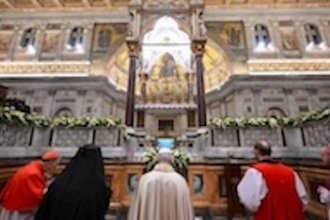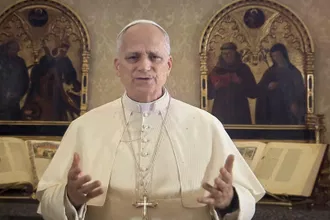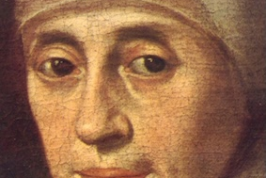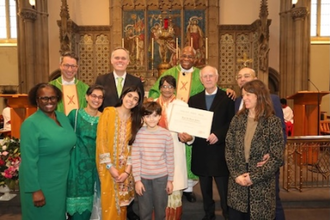Pope Leo: Crying is not weakness but an act of faith
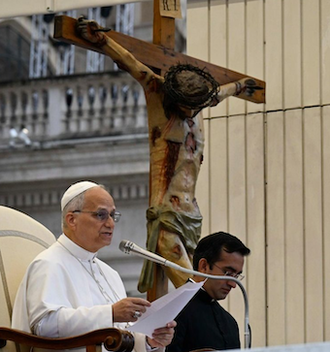
Image: Vatican Media
Source: Vatican Media
Reflecting at the weekly General Audience on the crucifixion, Pope Leo XIV stressed that Jesus' cry from the cross reveals "the final stage of a love that is given up to the very end," and encourages everyone to avoid seeing crying as a weakness but rather as an act of extreme prayer.
Pope Leo said Jesus did not die in silence. "He does not fade away gradually, like a light that burns out, but rather he leaves life with a cry." That cry, Pope Leo explained, is more than the body surrendering, "but the final sign of a life being surrendered." Before this, Jesus offers a question: "My God, my God, why hast thou forsaken me?"
The Pope highlighted that this shows that the Son, who had always been in communion with the Father, experienced silence, absence, and the abyss in the difficult moments of His Passion. Yet, Pope Leo clarified, "it is not a crisis of faith, but the final stage of a love that is given up to the very end."
Jesus cries out on the cross, not in desperation, but as a "sincerity, truth taken to the limit, trust that endures even when all is silent." At this same moment, the sky darkens and the veil in the temple is torn in two-as if all of creation was participating in Jesus' pain. But this moment of darkness also reveals something new: "God no longer dwells behind a veil-His face is now fully visible in the Crucified One."
That image of Jesus' broken body on the cross manifests the greatest love. We see that God is not distant from us, but He joins us in our pain, our life journey to the very end.
At the foot of the cross, one man understands this. The centurion - a pagan - comes to believe after witnessing how Jesus died. Pope Leo pointed out this first statement of faith after Jesus' death was not a fleeting profession, but one that truly touched and changed the heart.
"At times, what we are unable to say in words, we express with the voice," the Pope continued, "When the heart is full, it cries." This does not signify weakness, but rather a deep act of humanity.
The Gospel gives an "immense value to our cry" because it can express different feelings and struggles. Our cries can sometimes be a prayer, when words do not suffice.
In His final cry, Jesus gave everything He had left within Himself. He is an example that crying out does not mean giving up or resigning to one's fate. A person cries out because they believe someone can still hear them.
As Pope Leo explained, "one cries not out of desperation, but out of desire. Jesus did not cry out against the Father, but to Him."
In that act of faith, Jesus shows us that we, too, can cry out with trust and hope, even when things seem lost.
Crying out is, therefore, a spiritual act: it is the first gesture we make when we are born, and it is a means of staying alive.
Crying is a part of life - when we suffer, when we love, when we call out to others, etc. Pope Leo stressed that crying "is saying who we are, that we do not want to fade away in silence, that we still have something to offer."
In the difficult moments of life, Jesus' cry on the cross shows us "not to be afraid" to do the same. "A cry is never pointless, if it is born of love," the Pope urged, stressing that if addressed to God, a cry will not be ignored. Crying means rejecting cynicism and carrying on the belief that a different world is possible.
Pope Leo concluded by inviting everyone to genuinely cry out in the midst of trial, because if we make a cry to open our hearts, "it can be the threshold of a new light, of a new birth."
As he greeted pilgrims during the Audience, Pope Leo XIV asked for prayers and humanitarian projects on behalf of children suffering in places torn by war. "Remember in your prayers and humanitarian projects the children of Ukraine, Gaza, and other regions of the world afflicted by war," he said.
Speaking to Polish pilgrims, the Pope recalled the National Day of Polish Victims of War, which commemorates the suffering of children and their contribution to the reconstruction of Poland after World War II.
"I entrust you and the children who are suffering today to the protection of Mary, Queen of Peace," added the Pope.
He also prayed for everyone enduring the turbulent situation in the Middle East, as he greeted the Arabic-speaking faithful.
"I invite you to transform your cry in moments of trial and tribulation into a trusting prayer, because God always listens to his children and responds at the moment he deems best for us," he said. "May the Lord bless you all and always protect you from every evil!"
Watch a film of today's Audience on the Vatican Youtube channel: www.youtube.com/watch?v=649jhB8Rkls
Read the official prepared text of Pope Leo's address: https://press.vatican.va/content/salastampa/it/bollettino/pubblico/2025/09/10/0628/01100.html



